600-700
לפנה"ס הַנָּבִיא
הַנָּבִיא יִרְמְיָהוּ בִּירוּשָׁלַיִם
הַנָּבִיא יִרְמְיָהוּ הוֹלֵךְ בְּעִקְבוֹת הַנָּבִיא יְשַׁעְיָהוּ כְּנָבִיא הַמּוֹבִיל בְּדוֹרוֹ. בְּשָׁנִים שֶׁלְּאַחַר גָּלוּת שִׁבְטֵי הַצָּפוֹן בִּידֵי הָאַשּׁוּרִים, עָמְדָה מַמְלֶכֶת יְהוּדָה בִּפְנֵי עֲלִיָּתָהּ שֶׁל מַעֲצָמָה עוֹלָמִית חֲדָשָׁה: בָּבֶל.
בַּתְּמוּנָה: דֻּגְמָה לְאֹפֶן שֶׁבּוֹ בּוּלָה, חוֹתָם חֶרֶס חָקוּק, שִׁמֵּשׁ בִּימֵי קֶדֶם לְהַטְבָּעַת חוֹתָם עַל מִסְמָכִים

הַמּוּזֵאוֹן הַבְּרִיטִי , לוֹנְדוֹן
Sample Headline
Sample text. Click to select the text box. Click again or double click to start editing the text.
הַמֶּלֶךְ חִזְקִיָּהוּ שֶׁנָּשָׁא לְאִשָּׁה אֶת חֶפְצִיבָּה, בִּתּוֹ שֶׁל הַנָּבִיא יְשַׁעְיָהוּ, הֵבִין בְּאֶמְצָעוּת הַנְּבוּאָה שֶׁבָּנָיו לֹא יֵלְכוּ בְּדֶרֶךְ הַיָּשָׁר. חִזְקִיָּהוּ הַמֶּלֶךְ מֵת בִּשְׁנַת 687 לפנה"ס וּבְנוֹ מְנַשֶּׁה יָרַשׁ אוֹתוֹ כְּמֶלֶךְ יְהוּדָה, וּמָלַךְ עַד שְׁנַת 643 לפנה"ס.
בְּעוֹד הַמֶּלֶךְ חִזְקִיָּהוּ חִזֵּק אֶת שְׁמִירַת הַמִּצְווֹת בָּעָם, הַמֶּלֶךְ מְנַשֶּׁה בָּנָה מֵחָדָשׁ אֶת הַמִּקְדָּשִׁים וּמִזְבְּחוֹת הָאֱלִילִים שֶׁאָבִיו נִתֵּץ וְהִשְׁמִיד.
מְלָכִים ב' כ"א, א-ג:
"בֶּן־שְׁתֵּ֨ים עֶשְׂרֵ֤ה שָׁנָה֙ מְנַשֶּׁ֣ה בְמָלְכ֔וֹ וַֽחֲמִשִּׁ֤ים וְחָמֵשׁ֙ שָׁנָ֔ה מָלַ֖ךְ בִּירֽוּשָׁלִָ֑ם... וַיַּ֥עַשׂ הָרַ֖ע בְּעֵינֵ֣י ה’... וַיָּ֗שָׁב וַיִּ֨בֶן֙ אֶת־הַבָּמ֔וֹת אֲשֶׁ֥ר אִבַּ֖ד חִזְקִיָּ֣הוּ אָבִ֑יו וַיָּ֨קֶם מִזְבְּחֹ֜ת לַבַּ֗עַל וַיַּ֤עַשׂ אֲשֵׁרָה֙ ..."
מִנְסֶרֶת אֶסַרְחַדּוֹן ב', מִנְסָרָה מְשֻׁשָּׁה עֲשׂוּיַת חֵמָר הַמֻּצֶּגֶת בַּמּוּזֵאוֹן הַבְּרִיטִי, מַזְכִּירָה אֶת הַמֶּלֶךְ מְנַשֶּׁה בִּרְשִׁימַת הַמְּלָכִים, שֶׁאֶסַרְחַדּוֹן זִמֵּן בְּמַטָּרָה לְקַבֵּל מֵהֶם חָמְרֵי בְּנִיָּה לְאַרְמוֹנוֹ בְּנִינְוֵה. אֶסַרְחַדּוֹן הָיָה בְּנוֹ שֶׁל הַמֶּלֶךְ הַנֵּאוֹ-אַשּׁוּרִי סַנְחֵרִיב:
"וַאֲנִי (אֶסַרְחַדּוֹן) זִמַּנְתִּי אֶת הַמְּלָכִים... באלו מֶלֶךְ צוּר, מְנַשֶּׁה מֶלֶךְ יְהוּדָה... שָׁלַחְתִּי הוֹרָאוֹת לְכֻלָּם לְקוֹרוֹת גְּדוֹלוֹת... כָּל מָה שֶׁהָיָה נָחוּץ לָאַרְמוֹן שֶׁלִּי..."
Sample Headline
Sample text. Click to select the text box. Click again or double click to start editing the text.
מִדַּת רִשְׁעוּתוֹ שֶׁל הַמֶּלֶךְ מְנַשֶּׁה גְּדוֹלָה כָּל כָּךְ שֶׁהוּא מַצִּיב פֶּסֶל שֶׁל הָאֵלָה אֲשֵׁרָה בְּבֵית הַמִּקְדָּשׁ.
מְלָכִים ב' כ"א, ו-ז:
"וְהֶֽעֱבִ֤יר [מְנַשֶּׁה] אֶת־בְּנוֹ֙ בָּאֵ֔שׁ וְעוֹנֵ֣ן וְנִחֵ֔שׁ וְעָ֥שָׂה א֖וֹב וְיִדְּעֹנִ֑ים הִרְבָּ֗ה לַֽעֲשׂ֥וֹת הָרַ֛ע בְּעֵינֵ֥י יה' לְהַכְעִֽיס׃ וַיָּ֕שֶׂם אֶת־פֶּ֥סֶל הָֽאֲשֵׁרָ֖ה אֲשֶׁ֣ר עָשָׂ֑ה בַּבַּ֗יִת אֲשֶׁ֨ר אָמַ֤ר יה'..."
בַּתְּמוּנָה שֶׁלְּפָנֵנוּ נִרְאֵית צַלְמִית אֵלַת הַפּוֹרִיּוּת, אֲשֵׁרָה, עֲשׂוּיָה בְּרוֹנְזָה יַחַד עִם הַתַּבְנִית שֶׁבָּהּ נִצּוֹקָהּ. נִתָּן לַחֲזוֹת בָּהּ בְּמוּזֵאוֹן יִשְׂרָאֵל בִּירוּשָׁלַיִם.
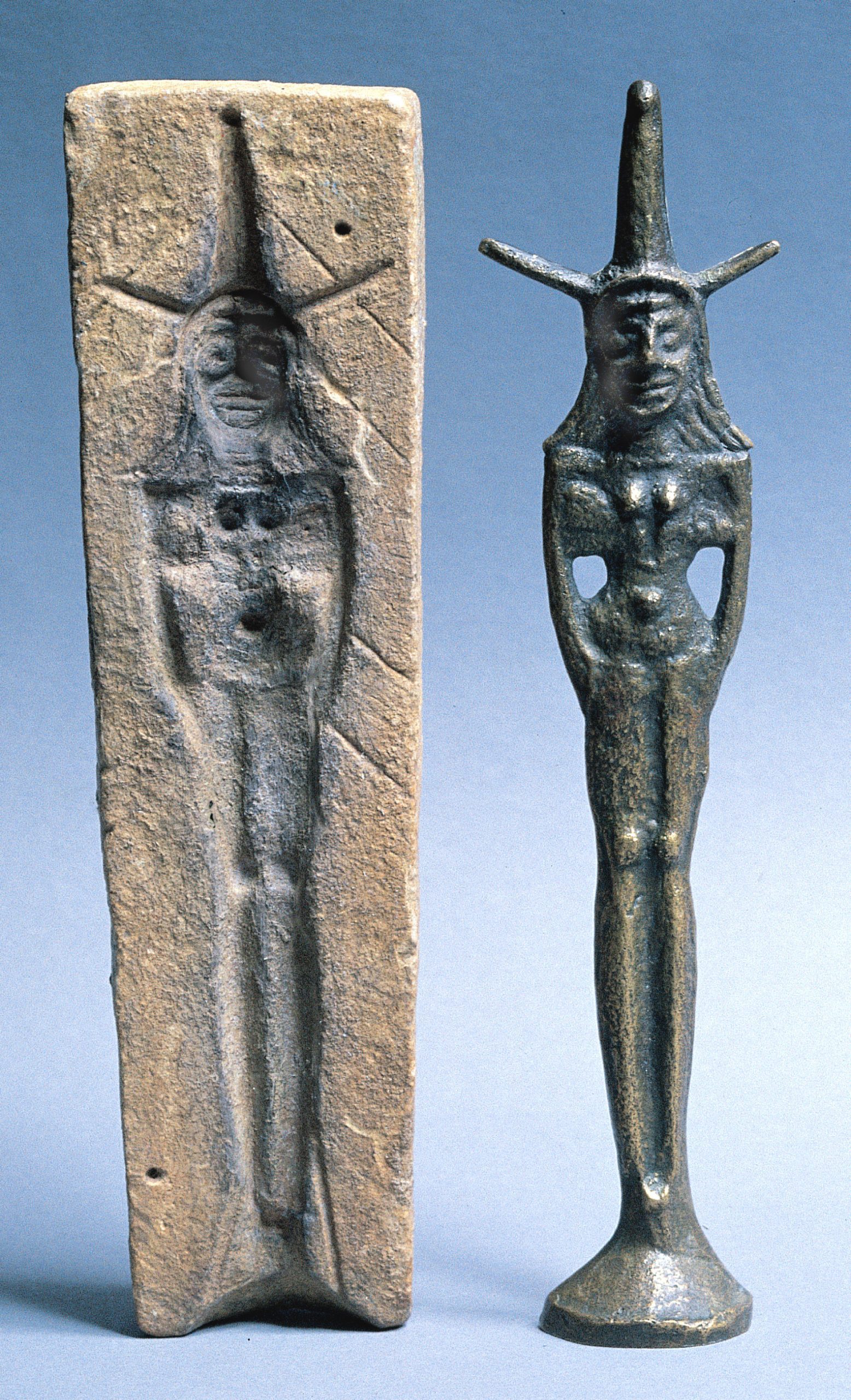
דֶּגֶם אַשֵׁרָה עֲשׂוּיָה מִבְּרוֹנְזָה
רָשׁוּת הָעַתִּיקוֹת / מוּזֵאוֹן יִשְׂרָאֵל, צִלּוּם: זְאֵב רדובן
הָאִזְכּוּר הָרִאשׁוֹן שֶׁל יוֹם הַשַּׁבָּת, בִּסְבִיבוֹת 650 לפנה"ס
אוֹסְטְרָקוֹן מֵצַד חֲשַׁבְיָהוּ
"וְהֶֽעֱבִ֤יר [מְנַשֶּׁה] אֶת־בְּנוֹ֙ בָּאֵ֔שׁ וְעוֹנֵ֣ן וְנִחֵ֔שׁ וְעָ֥שָׂה א֖וֹב וְיִדְּעֹנִ֑ים הִרְבָּ֗ה לַֽעֲשׂ֥וֹת הָרַ֛ע בְּעֵינֵ֥י יְהוָ֖ה לְהַכְעִֽיס׃ וַיָּ֕שֶׂם אֶת־פֶּ֥סֶל הָֽאֲשֵׁרָ֖ה אֲשֶׁ֣ר עָשָׂ֑ה בַּבַּ֗יִת אֲשֶׁ֨ר אָמַ֤ר יְהוָה֙..."
מִדַּת רִשְׁעוּתוֹ שֶׁל הַמֶּלֶךְ מְנַשֶּׁה גְּדוֹלָה כָּל כָּךְ שֶׁהוּא מַצִּיב פֶּסֶל שֶׁל הָאֵלָה אֲשֵׁרָה בְּבֵית הַמִּקְדָּשׁ.
מְלָכִים ב' כ"א, ו-ז:
"וְהֶֽעֱבִ֤יר [מְנַשֶּׁה] אֶת־בְּנוֹ֙ בָּאֵ֔שׁ וְעוֹנֵ֣ן וְנִחֵ֔שׁ וְעָ֥שָׂה א֖וֹב וְיִדְּעֹנִ֑ים הִרְבָּ֗ה לַֽעֲשׂ֥וֹת הָרַ֛ע בְּעֵינֵ֥י יה' לְהַכְעִֽיס׃ וַיָּ֕שֶׂם אֶת־פֶּ֥סֶל הָֽאֲשֵׁרָ֖ה אֲשֶׁ֣ר עָשָׂ֑ה בַּבַּ֗יִת אֲשֶׁ֨ר אָמַ֤ר יה'..."
בַּתְּמוּנָה שֶׁלְּפָנֵנוּ נִרְאֵית צַלְמִית אֵלַת הַפּוֹרִיּוּת, אֲשֵׁרָה, עֲשׂוּיָה בְּרוֹנְזָה יַחַד עִם הַתַּבְנִית שֶׁבָּהּ נִצּוֹקָהּ. נִתָּן לַחֲזוֹת בָּהּ בְּמוּזֵאוֹן יִשְׂרָאֵל בִּירוּשָׁלַיִם.
רָשׁוּת הָעַתִּיקוֹת / מוּזֵאוֹן יִשְׂרָאֵל
King Josiah, r. 640-609 BCE
2 Kin gs 22:1-2
Josiah was eight years old when he became king, and he reigned thirty-one years in Jerusalem… He did what was pleasing to the L-RD and he followed all the ways of his ancestor David…
2 Chronicles 34:3
In the eighth year of his reign (632 BCE), while he (Josiah) was still young, he began to seek the G-d of his father David, and in the twelfth year (628 BCE) he began to purge Judah and Jerusalem of the shrines, the sacred posts, the idols, and the molten images.
הַמֶּלֶךְ יֹאשִׁיָּהוּ שָׁלַט בֵּין הַשָּׁנִים 609-640 לפנה"ס. בִּתְקוּפַת מַלְכוּתוֹ הוּא הֵחֵל בָּרֵפוֹרְמָה הַגְּדוֹלָה נֶגֶד דַּרְכֵי הָאֱלִילִים שֶׁל אָמוֹן אָבִיו, וּמְנַשֶּׁה סָבוֹ. הוּא הֻנְּחָה עַל יְדֵי חִלְקִיָּה, הַכֹּהֵן הַגָּדוֹל הַקַּנָּאִי לִדְבַר ה', וּבְנוֹ, הַנָּבִיא יִרְמְיָהוּ.
מְלָכִים ב' כ"ב, א-ב:
"בֶּן־שְׁמֹנֶ֤ה שָׁנָה֙ יֹֽאשִׁיָּ֣הוּ בְמָלְכ֔וֹ וּשְׁלֹשִׁ֤ים וְאַחַת֙ שָׁנָ֔ה מָלַ֖ךְ בִּירֽוּשָׁלִָ֑ם... וַיַּ֥עַשׂ הַיָּשָׁ֖ר בְּעֵינֵ֣י ה’ וַיֵּ֗לֶךְ בְּכָל־דֶּ֨רֶךְ֙ דָּוִ֣ד אָבִ֔יו וְלֹא־סָ֖ר יָמִ֥ין וּשְׂמֹֽאול."
דִּבְרֵי הַיָּמִים ב' ל"ד, ג:
"וּבִשְׁמוֹנֶ֨ה שָׁנִ֜ים לְמָלְכ֗וֹ (632 לפנה"ס) וְהוּא֙ (יאשיהו) עוֹדֶ֣נּוּ נַ֔עַר הֵחֵ֕ל לִדְר֕וֹשׁ לֵֽאלֹהֵ֖י דָּוִ֣יד אָבִ֑יו וּבִשְׁתֵּ֧ים עֶשְׂרֵ֣ה שָׁנָ֗ה (628 לפנה"ס) הֵחֵל֙ לְטַהֵ֗ר אֶת־יְהוּדָה֙ וִיר֣וּשָׁלִַ֔ם מִן־הַבָּמוֹת֙ וְהָ֣אֲשֵׁרִ֔ים וְהַפְּסִלִ֖ים וְהַמַּסֵּכֽוֹת."
Josiah holding his son, Jechonias, Michelangelo, The Sistine Chapel
הַמֶּלֶךְ יֹאשִׁיָּהוּ שָׁמַר אֶת הַפֶּסַח וְהֶחֱזִיר אֶת אֲרוֹן הַבְּרִית לְבֵית הַמִּקְדָּשׁ
Sample text. Click to select the text box. Click again or double click to start editing the text.
Sample Headline
Sample text. Click to select the text box. Click again or double click to start editing the text.
Jeremiah Begins His Prophecy, c. 627 BCE
Jeremiah 1:2-3
The word of the L-RD came to Jeremiah in the days of King Josiah son of Amon of Judah, in the thirteenth year of his reign, and throughout the days of King Jehoiakim son of Josiah of Judah, and until the end of the eleventh year of King Zedekiah son of Josiah king of Judah, when Jerusalem went into exile (in Babylonia and Egypt).
Sample Headline
Sample text. Click to select the text box. Click again or double click to start editing the text.
Michelangelo, The Sistine Chapel
The Priestly Blessing, The Oldest Biblical Inscription, Dated from the Time of King Josiah
Numbers 6:24-25
May the L-RD bless you and keep you;
may the L-RD make His face to shine upon you and be gracious to you…
The Silver Scroll Amulet
“May Y-H-V-H bless you and may he keep you.
May Y-H-V-H make his face shine...”
Pictured here is a small silver scroll amulet, found in 1979, containing the oldest Biblical Inscription, dating back to the time of King Josiah. Two silver scrolls were found in a burial chamber together with other ancient artifacts in the Hinnom Valley, south of the ancient city of Jerusalem by archaeologist Gabi Barkay.
Included
in the engraved Hebrew text is the Priestly blessing found in Numbers 6:24-25
The L-RD will bless you and keep you;
The L-RD will shine His face upon you and
be gracious to you
The L-RD will turn His face towards you and
give you peace.
The Silver Scroll
Amulet reads: “May the L-RD bless you and may He keep
you.May the L-RD make His face shine...” The
Scroll is on display at the Israel Museum in Jerusalem
Sample Headline
Sample text. Click to select the text box. Click again or double click to start editing the text.

Israel Antiquities Authority / Israel Museum
Photo by Bruce Zuckerman, USC West Semitic Research Project
The Discovery of the Priestly Blessing Outside the Walls of Jerusalem
Sample Headline
Sample text. Click to select the text box. Click again or double click to start editing the text.
City of David Megalim Institute
Courtesy of George Blumenthal and the Gol Family
Bulla Seals
A Bulla is a seal impression that was used to seal documents as a form of authentication and tamper-proofing. The seal impression was usually made by a signet ring carrying the reverse letters so that the letters will read properly when impressed on a piece of clay.
Sample Headline
Sample text. Click to select the text box. Click again or double click to start editing the text.
Receipt for a Grain Loan, Sealed papyrus from the Jewish Garrison in Elephantine, Egypt, 402 BCE, Brooklyn Museum

Museum of the Bibliothèque nationale de France,
Photo by Zev Radovan
Hilkiah the High Priest Discovers the Book of Deuteronomy, c. 622 BCE
2 Kings 22:3-8
In the eighteenth year of King Josiah…the high priest Hilkiah said to the scribe Shaphan, “I have found a scroll of the Teaching in the House of the L-RD!”
Ring Inscription
“Belonging to Hanan, Son of Hilkiah the Priest”
Sample Headline
Sample text. Click to select the text box. Click again or double click to start editing the text.
Seal Impression of Nathan-Melek, Servant of the King
2 Kings 23:11
[King Josiah] did away with the horses that the kings of Judah had dedicated to the sun, at the entrance of the House of the L-RD, near the chamber of the eunuch Nathan-melech, which was in the precincts. He burned the chariots of the sun.
Sample Headline
Sample text. Click to select the text box. Click again or double click to start editing the text.
Israel Antiquities Authority / City of David
Photo by Eliyahu Yanai
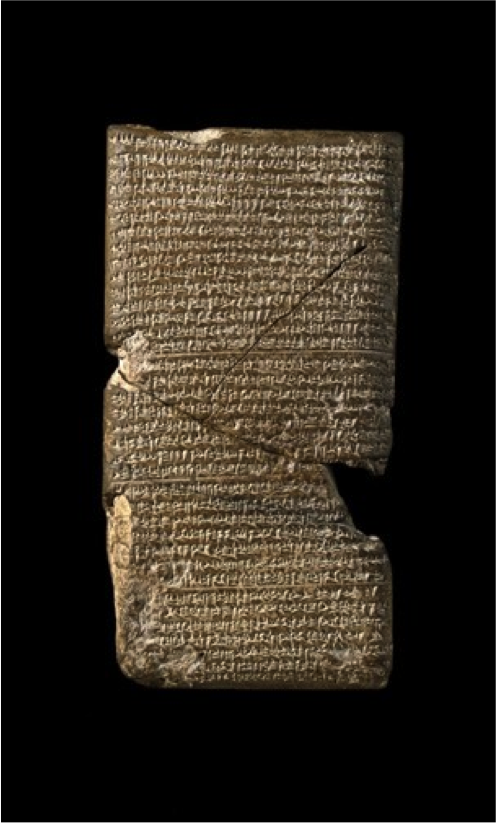
The British Museum
Babylonians Destroy the Assyrian City of Nineveh, 612 BCE
Nahum 3:18-19
O king of Assyria…
All who hear the news of you
applaud your downfall…
The Fall of Nineveh in the Babylonian Chronicle
“…a mighty assault he (Nabopolassar father of Nebuchadnezzar II of Babylon) made upon the city (Nineveh). …a great slaughter was made of the people and nobles.”
Instability rocked the Assyrian empire, giving rise to the
Neo-Babylonian Empire in the northeast, and Egypt regaining power in the
southwest. Judah situated between them was to be destroyed in the ensuing
struggle in which the Babylonians eventually prevailed.
In the year 612 BCE the Babylonians destroyed the Assyrian
City of Nineveh.
The book of the Prophet Nahum chapter 3: verse 18-19 refers
to this: O king of Assyria…All who hear about
your (downfall) will clap their hands over you, for on whom has not your evil
passed continually?
The Fall of the city Nineveh is mentioned in one of the
Babylonian Chronicle clay tablets referring to Nabopolassar, the father of
Nebuchadnezzar II of Babylon:
“…a mighty assault he
made upon the city. …a great
slaughter was made of the people and nobles.”
Josiah Is Fatally Wounded by the Egyptians at Megiddo, c. 609 BCE
2 Chronicles 35:20-24
...King Neco (II) of Egypt came up to fight [against the Babylonians] at Carchemish on the Euphrates, and Josiah went out against him.
[Neco] sent messengers to him, saying, “What have I to do with you, king of Judah? I do not march against you this day but against the kingdom that wars with me...
But Josiah would not let him alone; instead… he came to fight in the plain of Megiddo. Archers shot King Josiah, and the king said to his servants, “Get me away from here, for I am badly wounded.”
His servants...conveyed him to Jerusalem. There he died and was buried in the grave of his fathers, and all Judah and Jerusalem went into mourning over Josiah.
Sample Headline
Sample text. Click to select the text box. Click again or double click to start editing the text.
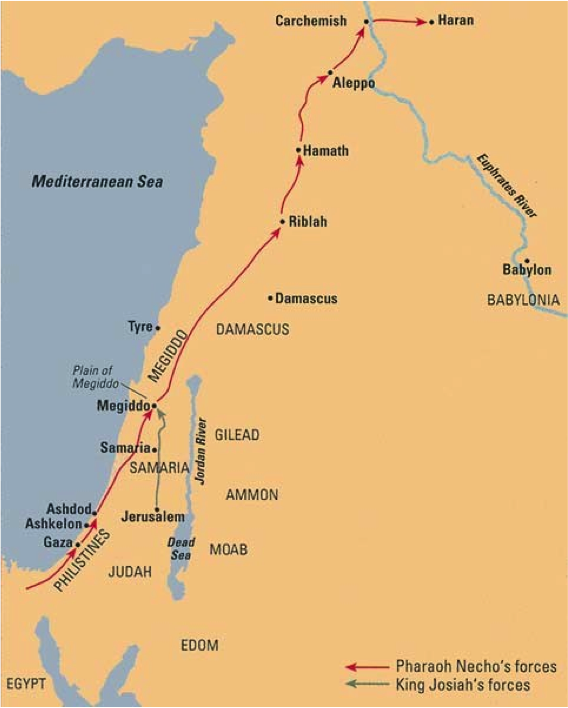
Biblical Archaeology Society
Pharaoh Neco II Crowns Jehoiakim King of Judah,
c. 609 BCE
2 Chronicles 36:1-41
Then the people of the land took Jehoahaz son of Josiah and made him king in Jerusalem in place of his father.
Jehoahaz was twenty-three years old when he became king, and he reigned in Jerusalem three months. And the king of Egypt (Neco II) dethroned him in Jerusalem and imposed on Judah a levy of a hundred talents of silver and a talent of gold.
Then Neco (II) king of Egypt made Eliakim brother of Jehoahaz king over Judah and Jerusalem, and he changed Eliakim’s name to Jehoiakim. But Neco took Eliakim’s brother Jehoahaz and carried him off to Egypt.
Sample Headline
Sample text. Click to select the text box. Click again or double click to start editing the text.
Bronze statue of Pharaoh Neco II,
Penn Museum, Philadelphia
Nebuchadnezzar's First Campaign, 605 BCE
Jeremiah 46:2
Of Egypt: concerning the army of Pharaoh-Neco king of Egypt, which was by the river Euphrates in Carchemish, which Nebuchadnezzar king of Babylon smote in the fourth year of Jehoiakim the son of Josiah, king of Judah.
Nebuchadnezzar Chronicle:
"In the 21st year of the king of Akkad (Nabopolassar) stayed in his own land, and Nebuchadnezzar his eldest son, the crown-prince mustered the Babylonian army... he marched to Carchemish...crossed the river to go against the Egyptian army... Nebuchadnezzar conquered the whole area of Hamath..."
Sample Headline
Sample text. Click to select the text box. Click again or double click to start editing the text.
Biblical Archaeology Society
The Royal Quarter and
Bullae House
Jeremiah 36:25-26
...Elnathan, Delaiah, and Gemariah begged the king not to burn the scroll, but he would not listen to them. The king ordered Jerahmeel, the king’s son, and Seraiah son of Azriel, and Shelemiah son of Abdeel, to arrest the scribe Baruch and the prophet Jeremiah.
Sample Headline
Sample text. Click to select the text box. Click again or double click to start editing the text.
City of David Megalim Institute
Courtesy of George Blumenthal and the Gol Family
King Jehioakim Cuts the Scroll of Jeremiah's Pronouncement
Jeremiah 36:21, 23
The king sent Jehudi to get the scroll and he fetched it from the chamber of the scribe Elishama. Jehudi read it to the king and to all the officials who were in attendance on the king...
And every time Jehudi read three or four columns, the king would cut it up with a scribe’s knife and throw it into the fire in the brazier, until the entire scroll was consumed by the fire in the brazier.
In 2016, a rare papyrus document was discovered, dating to the 7th Century BCE. This document contained earliest known extra-biblical reference to Jerusalem written in Hebrew writing. The papyrus is much like the one that King Jehioakim would have cut and thrown into the fire.
Oldest Written Mention of Jerusalem in Hebrew, 7th Century BCE
“From the female servant of the king, from Naharata (a place near Jericho) two wineskins to Jerusalem.”
Sample Headline
Sample text. Click to select the text box. Click again or double click to start editing the text.
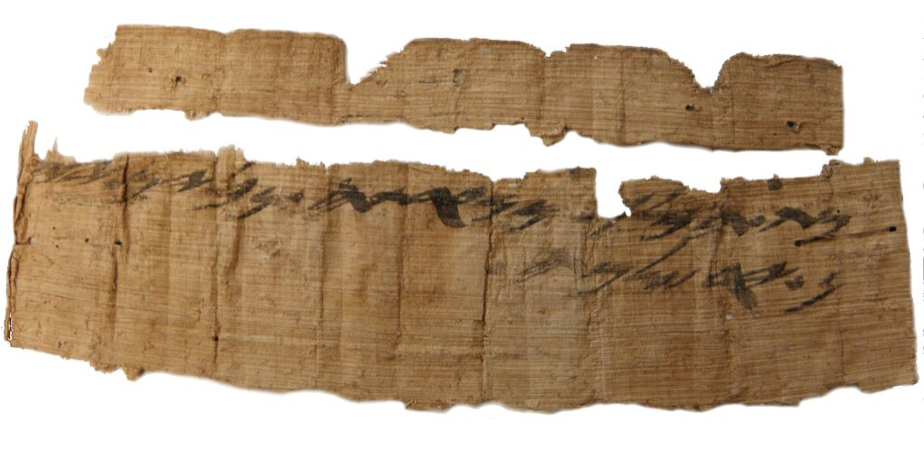
Israel Antiquities Authority
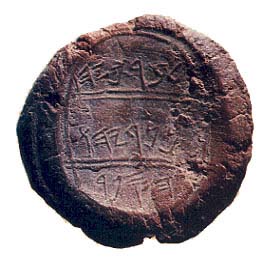
Israel Antiquities Authority / Israel Museum,
Photo by David Harris
"Baruch, the Son of Neriyahu, the Scribe," Seal Impression, c. 605 BCE
Jeremiah 36:1, 4
In the fourth year of King Jehoiakim son of Josiah of Judah, this word came to Jeremiah from the L-RD: Get a scroll and write upon it all the words I have spoken to you concerning Israel…
Jeremiah called Baruch son of Neriah (Neriyahu); and Baruch wrote down in the scroll, at Jeremiah’s dictation, all the words which the L-RD had spoken to him.
Sample Headline
Sample text. Click to select the text box. Click again or double click to start editing the text.
"Gemaryahu,
Son of Shaphan"
Seal Impression, c. 604 BCE
Jeremiah 36:9-10
In the ninth month of the fifth year of King Jehoiakim son of Josiah of Judah, all the people in Jerusalem and all the people coming from Judah proclaimed a fast before the L-RD in Jerusalem.
It was then that Baruch—in the chamber of Gemariah (Gemaryahu) son of Shaphan the scribe, in the upper court, near the new gateway of the House of the L-RD—read the words of Jeremiah from the scroll to all the people in the House of the L -RD.
Sample text. Click to select the Text Element.
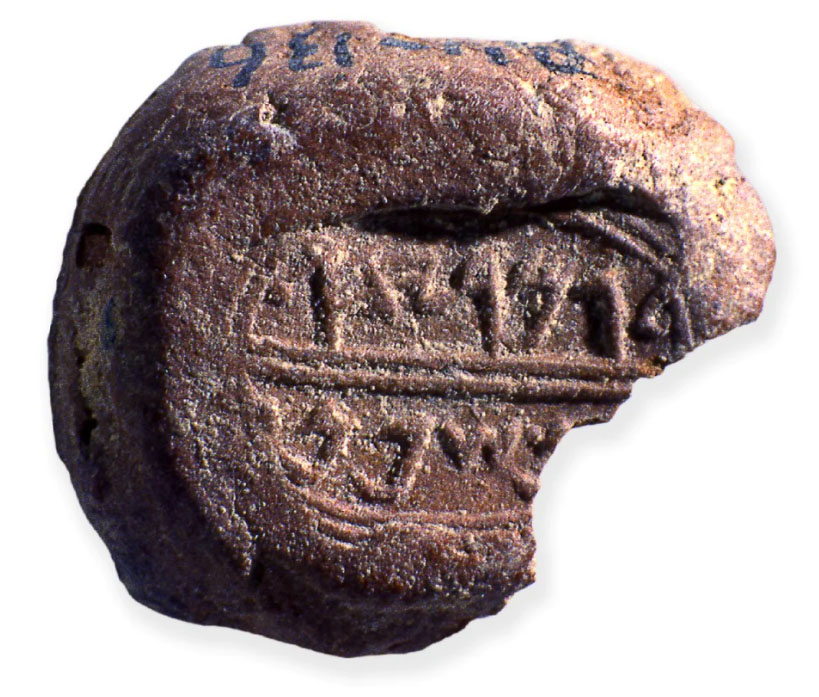
Israel Museum / Israel Antiquities Authority / City of David

Temple Mount Sifting Project, Photo by Zachi Zweig
Bulla Seal from
First Temple Priest Immer
Jeremiah 20:1
Pashhur son of Immer, the priest who was chief officer of the House of the L-RD, heard Jeremiah prophesy these things.
Bulla Inscription, 7th Century BCE
“Belonging to Galyahu [son of] Immer.”
The Immers were a well-known family of priests at the end of the First Temple period. Pashur ben Immer is mentioned in Jeremiah 20:1. Archaeologist Tzahi Dvira said, “This seal was used to stamp luxury items that were kept in the treasury of the Temple, which was administered by the priests. This stamp seal is the first Hebrew inscription that was ever discovered from the First Temple and constitutes direct evidence of the administrative activity of the First Temple priests.”
Sample Headline
Sample text. Click to select the text box. Click again or double click to start editing the text.
created with
WordPress Website Builder .